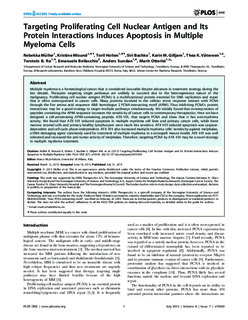Targeting Proliferating Cell Nuclear Antigen and Its Protein Interactions Induces Apoptosis in Multiple Myeloma Cells
Müller, Rebekka; Misund, Kristine; Holien, Toril; Bachke, Siri; Gilljam, Karin Margaretha; Våtsveen, Thea Kristin; Rø, Torstein Baade; Bellacchio, E.; Sundan, Anders; Otterlei, Marit
Journal article, Peer reviewed
Permanent lenke
http://hdl.handle.net/11250/2364435Utgivelsesdato
2013Metadata
Vis full innførselSamlinger
Sammendrag
Multiple myeloma is a hematological cancer that is considered incurable despite advances in treatment strategy during the last decade. Therapies targeting single pathways are unlikely to succeed due to the heterogeneous nature of the malignancy. Proliferating cell nuclear antigen (PCNA) is a multifunctional protein essential for DNA replication and repair that is often overexpressed in cancer cells. Many proteins involved in the cellular stress response interact with PCNA through the five amino acid sequence AlkB homologue 2 PCNA-interacting motif (APIM). Thus inhibiting PCNA’s protein interactions may be a good strategy to target multiple pathways simultaneously. We initially found that overexpression of peptides containing the APIM sequence increases the sensitivity of cancer cells to contemporary therapeutics. Here we have designed a cell-penetrating APIM-containing peptide, ATX-101, that targets PCNA and show that it has anti-myeloma activity. We found that ATX-101 induced apoptosis in multiple myeloma cell lines and primary cancer cells, while bone marrow stromal cells and primary healthy lymphocytes were much less sensitive. ATX-101-induced apoptosis was caspase-dependent and cell cycle phase-independent. ATX-101 also increased multiple myeloma cells’ sensitivity against melphalan, a DNA damaging agent commonly used for treatment of multiple myeloma. In a xenograft mouse model, ATX-101 was well tolerated and increased the anti-tumor activity of melphalan. Therefore, targeting PCNA by ATX-101 may be a novel strategy in multiple myeloma treatment.
